The U.S. unemployment rate crept back up to 9% last week, but some cities are feeling the pain far worse than others.
Roughly 112 metro areas in the U.S. are still dealing with 10% unemployment or greater. That's down from 166 at the same time last year, but tell that to folks in El Centro, Calif., where nearly one in every four people is unemployed. The Riverside-San Bernardino-Ontario area in California is still dealing with nearly 14% unemployment, while the 13.3% unemployment in Las Vegas is not only driving up foreclosures, but driving down traffic to its McCarran airport. Passenger numbers fell off 2.6% last year.
On the other side of the recovery, more than 210 cities are below the average U.S. rate and 65 areas dipped below 7%. If you've got a sweet gig at the University of Nebraska or have a steady buyer for your grain or corn-based ethanol, count yourself among the lucky residents of Lincoln, Neb., who aren't part of the city's absurdly low 4.1% unemployment rate. That's still up from 3% just two years ago, however, and is only a hair better than the 4.2% rate in Bismarck, N.D.
It takes more than just a low unemployment rate in a small town to show the world you've weathered years of recession-fueled financial woes. With help from the Census Department, the Bureau of Labor Statistics and the Bureau of Economic Analysis, TheStreet found U.S. cities that not only withstood the economic downturn, but seemingly ignored it:
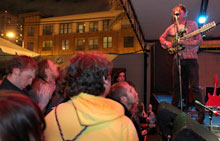
©Anthony Bolante/Blixah/AP
Austin, Texas
Reported GDP in 2009: $73 billion
Reported GDP today: $78.4 billion
Unemployment: 6.8%
Population change 2000-10: 20.4%
The locals want to keep Austin weird, and having a glut of jobs and a growing city definitely qualifies as weird during a period of financial turmoil. Heavy hitters such as Dell, the University of Texas, Whole Foods and Forestar Group have helped by doling out jobs, and newcomers such as Samsung have added to the city's work force. But a town that's staked its reputation on art-and-music-fueled funkiness seems to expand every time the South By Southwest music, technology and movie festival rolls through.
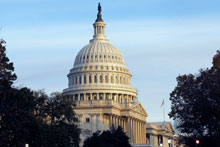
©Alex Brandon/AP
Washington, D.C.
Reported GDP in 2009: $366.6 billion
Reported GDP today: $407.5 billion
Unemployment: 5.8%
Population change 2000-10: 2.8%
With government jobs, lobbying and contracting gigs linked to those government jobs, a huge law community, a heavy tourist draw and the bolstering presence of universities such as Georgetown, George Washington, Howard and American and companies including Danaher and Pepco Holdings, D.C. and its surrounding areas were doing just fine before the recession. When the government decided the best way to upend that recession was to beat it over the head with money until it went away, that certainly didn't hurt the city's cause.
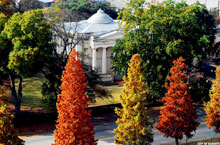
©City of Augusta
Augusta, Ga.
Reported GDP in 2009: $17 billion
Reported GDP today: $18.4 billion
Unemployment: 8.4%
Population change 2000-10: 0.3%
It's not all of the sun-baked fellows in the galleries yelling "It's in the hole" at the Masters Tournament or the tourists getting a taste of the city's powerfully hot summers that have kept the city growing and its unemployment numbers on the wane since 2009. Instead, Augusta steeled itself against the recession in the best way a city can -- by building its economy around a recession-proof industry. In Augusta's case, the medical, biotech and military communities provided a stable base as the rest of Georgia crashed. The state's unemployment mark still sits at 9.8%, above the national average, but a large medical community and an Army Signal Corps facility allowed Augusta to keep its cool.
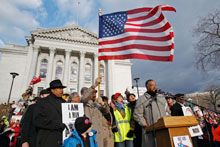
©Andy Manis/AP
Madison, Wis.
Reported GDP in 2009: $31.2 billion
Reported GDP today: $34.8 billion
Unemployment: 5.7%
Population change 2000-10: 11.6%
If that 5.7% unemployment rate looks enticing, you should have been in Madison during the recession in 2009, when unemployment was at 3.5%. That's not a headline from The Onion, either, as the University of Wisconsin, the state government (protests and all) and the surrounding medical and biotech communities have largely shielded Madison from the recession's effects. Companies such as Spectrum Brands seem fairly happy here as well, which has created a business base that makes Wisconsin grads slightly more inclined to stay.
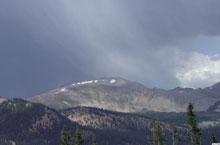
©gmar/flickr
Boulder, Colo.
Reported GDP in 2009: $16.2 billion
Reported GDP today: $17.6 billion
Unemployment: 6.9%
Population change 2000-10: 5.8%
The University of Colorado gets all the credit for keeping jobs around but, like Austin, Boulder's hippie roots and artistic bent do a nice job of keeping the foot traffic moving and keeping the place just a little quirky. This helps spice up the job mix a bit by placing ad firm Crispin Porter + Bogusky, Celestial Seasonings tea and plastic sandal maker Crocs to the list of employers, but the area still relies heavily on scientific institutions such as the Center For Astrophysics and Space Astronomy, the National Oceanic and Atmospheric Administration and the Space Science Institute, as well as straitlaced companies including IBM, Lockheed Martin and Ball Aerospace & Technologies to keep the party going.
Click here to see the full list of Cities Unaffected by a Bad Economy
appraisal management, fha appraisals, appraisal management companies, fha appraisal compliance, reverse mortgage appraisals
No comments:
Post a Comment